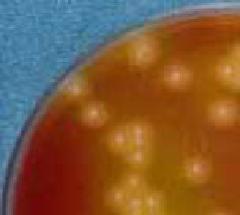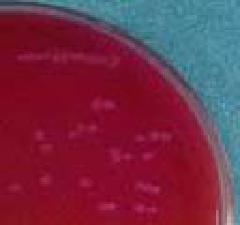- Yokohama-shi Top Page
- Health, Medical Care and Welfare
- Health and Medical Care
- Food safety
- Food Sanitation Laboratory
- Bacterial testing
- Other food poisoning bacteria test
Here's the text.
Other food poisoning bacteria test
Last update date April 2, 2024
Other food poisoning bacteria
It is not classified into either infectious or toxin type.
Welsh fungus

Welsh bacteria on egg yolk CW agar medium
It is widely distributed in nature and is resident in the soil, water, human and animal intestines. It may form a shell called spores, and may survive even if heated at 100°C for 1 to 6 hours. In addition, since this bacterium grows under anaerobic conditions with low air, it is likely to become a causative food when a large amount of curry and stew.
Inspection methods
After inoculation in egg yolk CW agar medium, after anaerobic culture, the typical colony is sterilized using a cooked medium medium, and a property test is performed to confirm.
Cereus

Celeus bacteria on NGKG agar medium
It is widely distributed in nature, such as soil and dust, and usually forms spores and germinates when conditions are met. It is resistant to heat and is a type of spoilage bacteria in food.
It is often caused by foods that are made from crops such as grains.
Inspection methods
Inoculated in NGKG agar medium, a property test is performed for a typical colony to confirm.
Pathogenic Escherichia coli (diarrhea Hara Escherichia coli)
Escherichia coli is a type of bacteria that constitutes the intestinal flora of various animals, including humans, but the feces excreted from these animals is widely distributed in the natural world as a result of polluting various things. I am.
Among them, there are types that cause diarrhea in humans, collectively referred to as pathogenic Escherichia coli, and typical ones such as "O157" and "O26".
Enterohemorrhagic Escherichia coli produces verotoxin and can cause complications such as hemolytic uremic syndrome (HUS), but may not develop when infected.
As a precaution, wash your hands thoroughly, wash the ingredients well and heat them sufficiently (at the center is 75 ° C for at least 1 minute).
In yakiniku, etc., care must be taken when handling tongs and chopsticks used, such as separating raw meat and eating. Also, don't drink well water.
If infected, consult a doctor immediately and be careful not to spread the contamination of the infected person's stool.
For inquiries to this page
Medical Care Bureau Health and Safety Department Central Wholesale Market Home Food Sanitation Laboratory
Phone: 045-441-1153
Phone: 045-441-1153
Fax: 045-441-8009
Email address: ir-honjo@city.yokohama.jp
Page ID: 937-122-468







